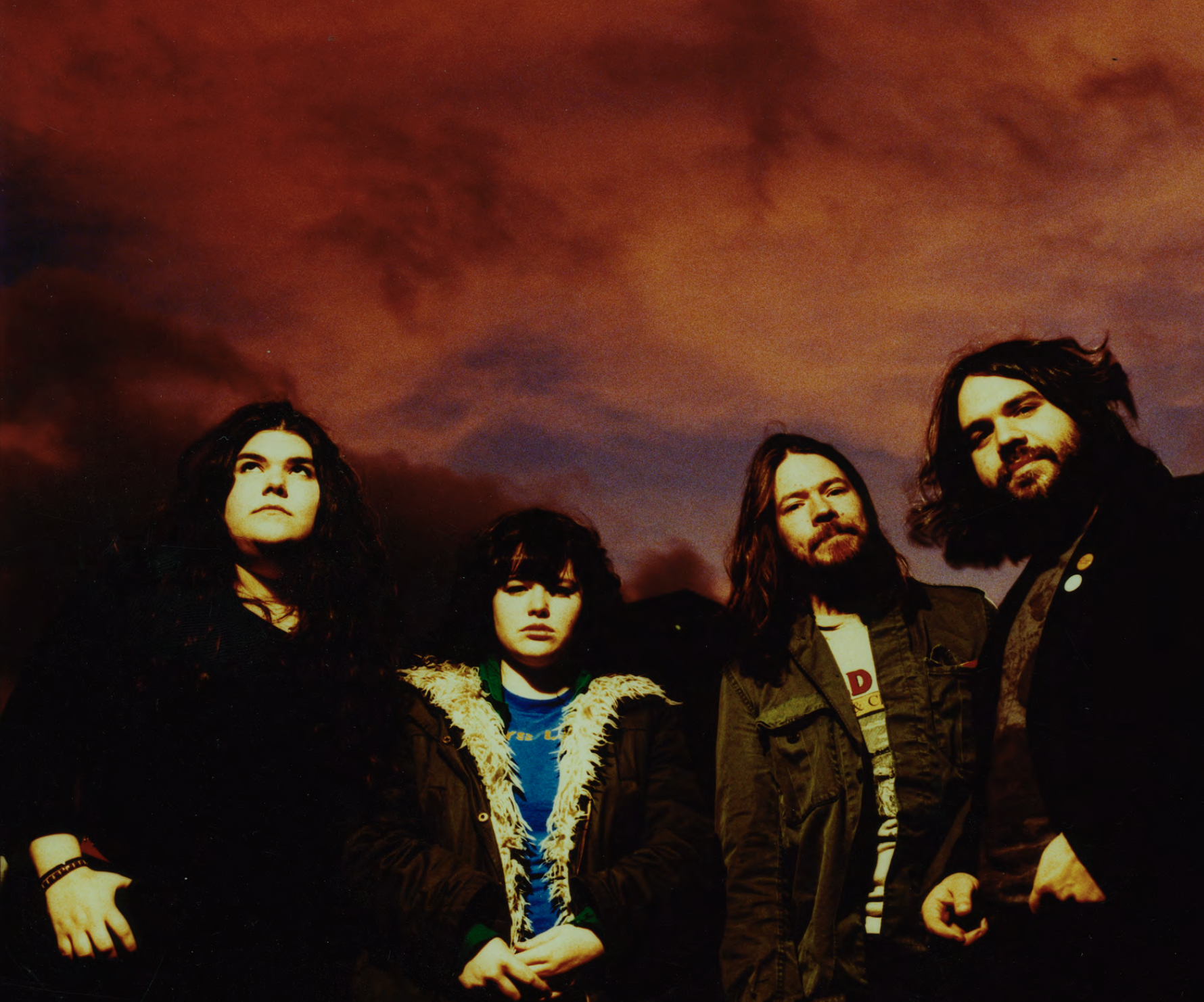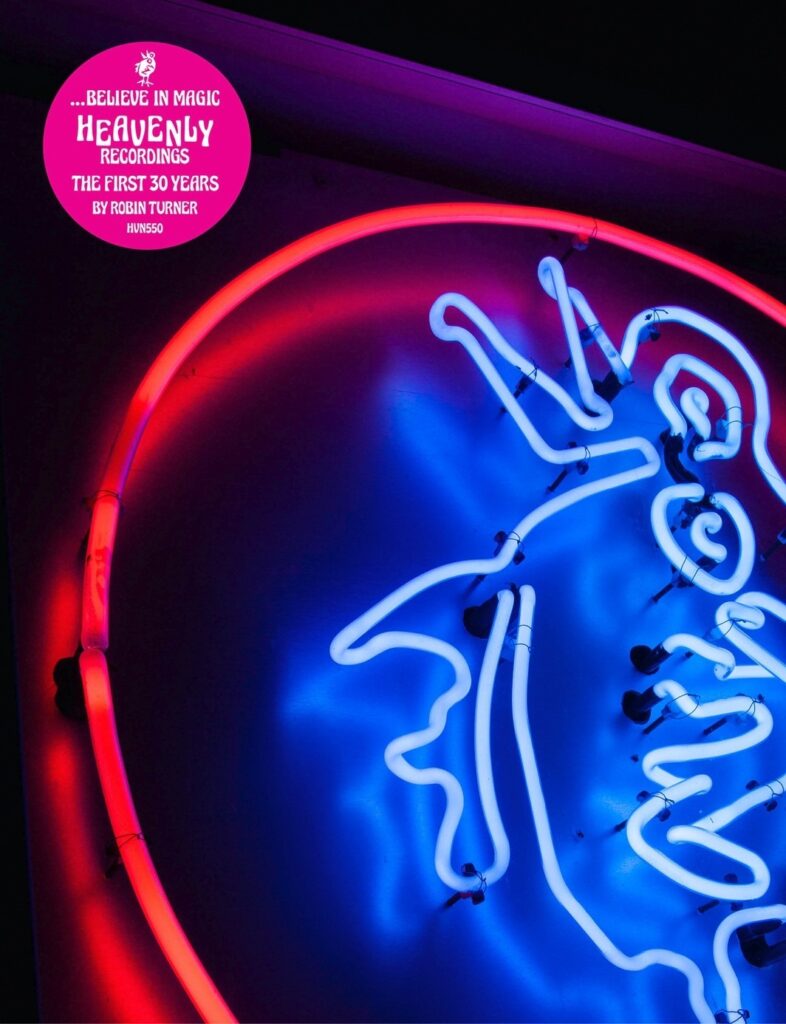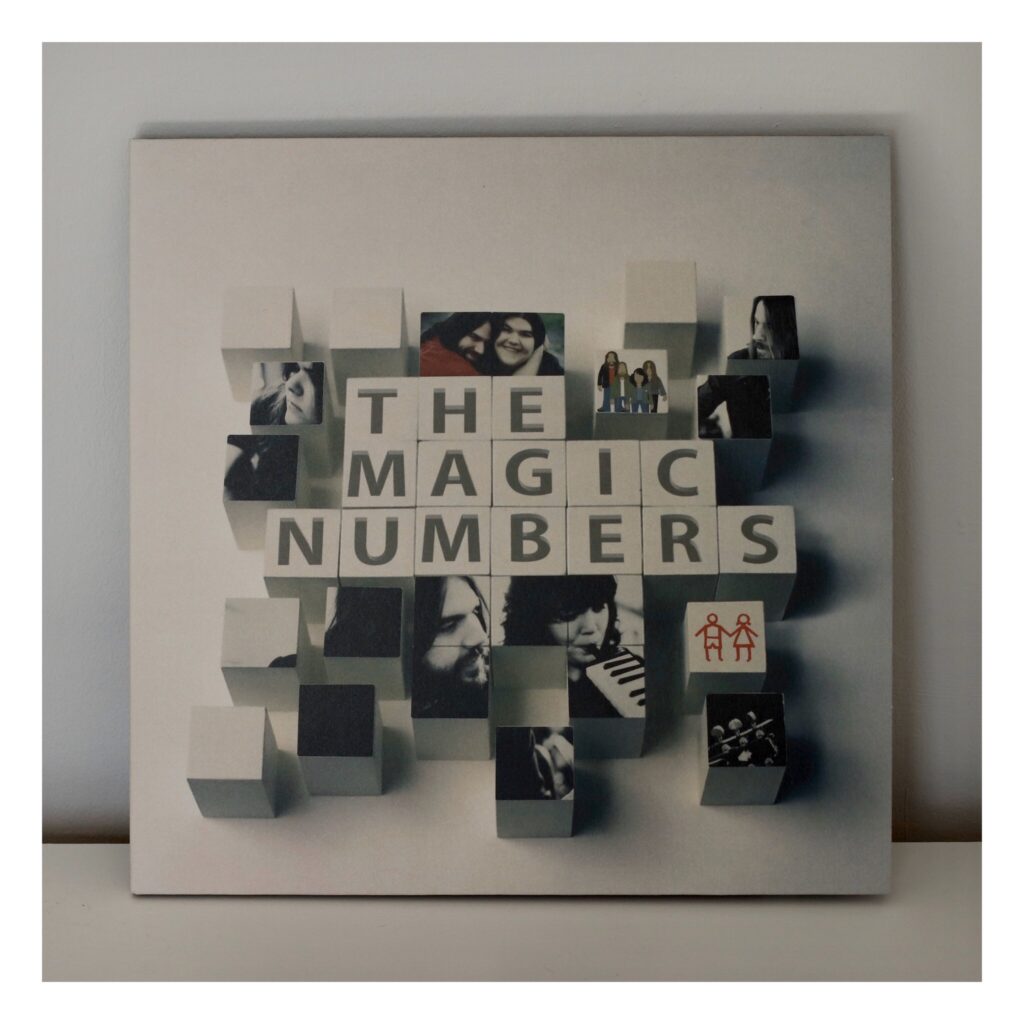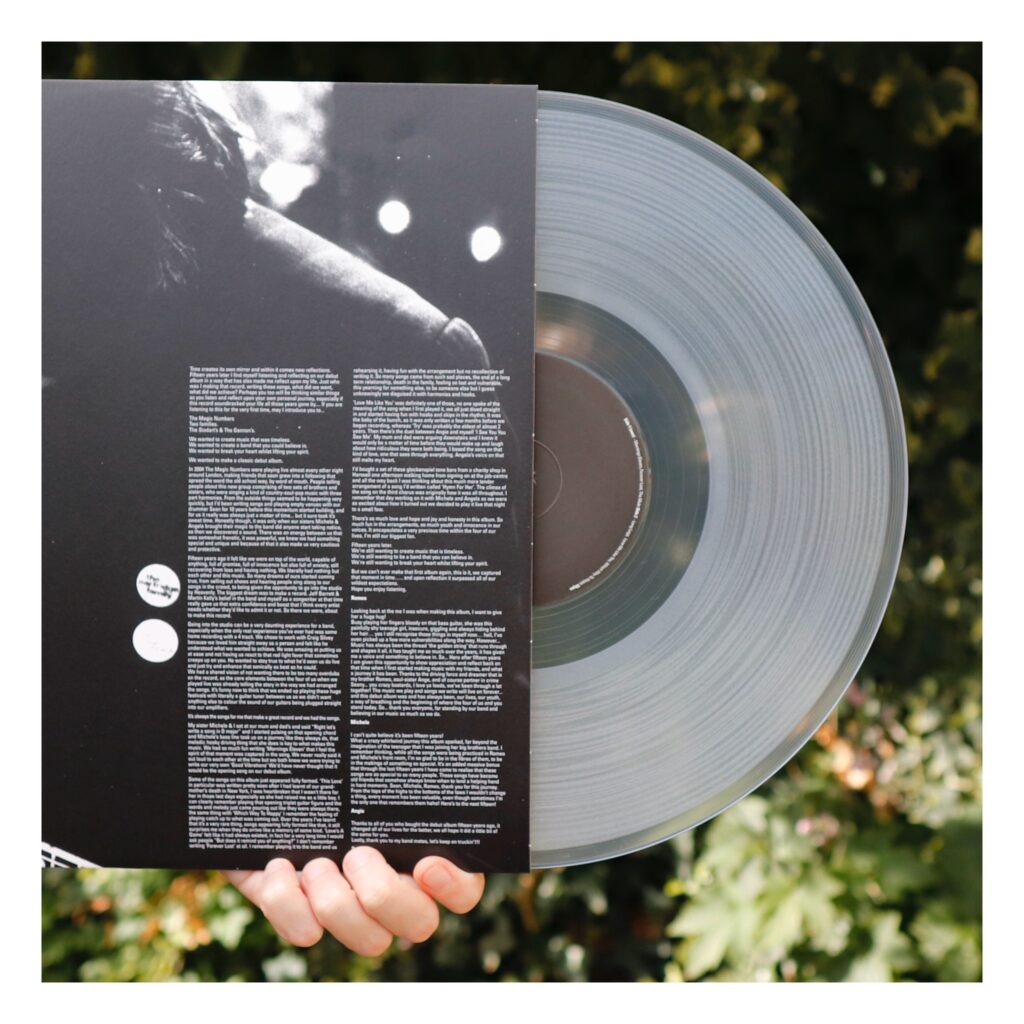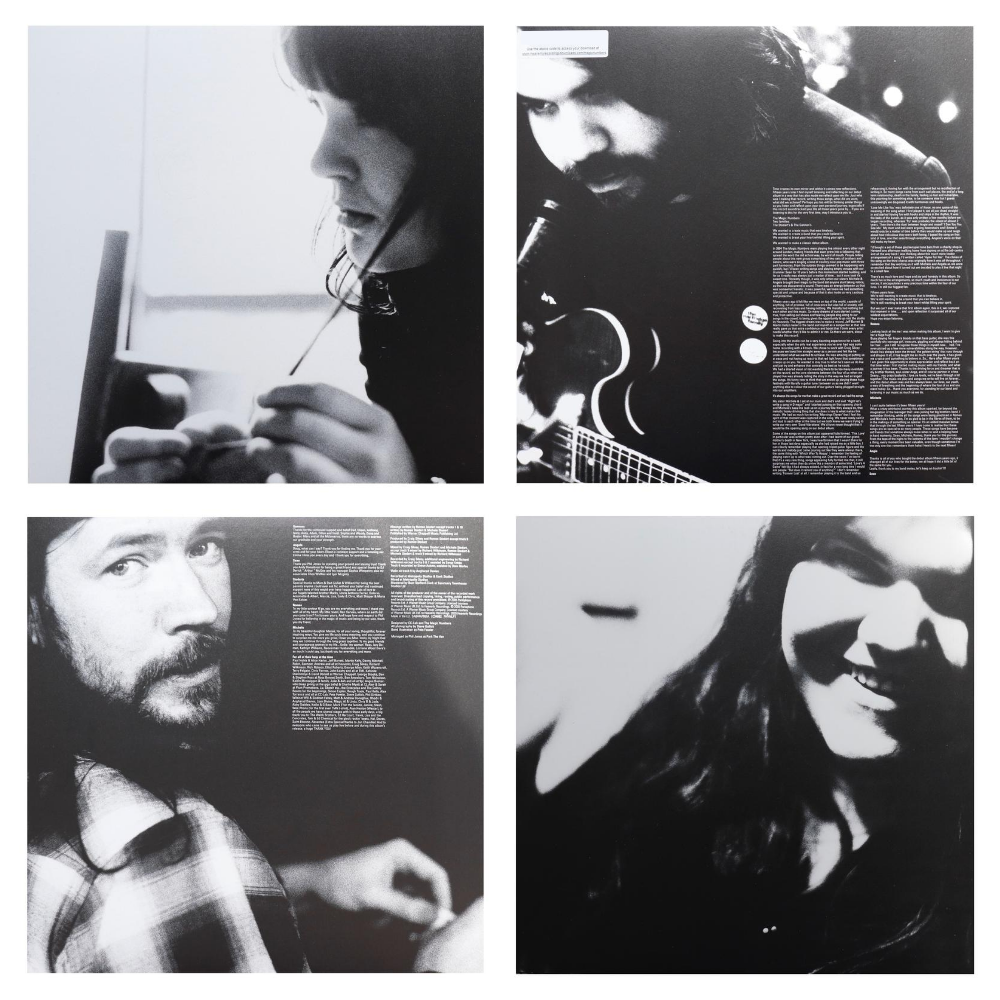Back in January I cycled from Blackfriars to Little Portland Street on a gloomy evening to celebrate the 20thbirthday party of The Social. An hour or so before festivities started I met with Jeff and Danny from Heavenly to discuss the book we were all working on written by Heavenly stalwart Robin Turner, marking another anniversary, the label’s 30th. Anyone who is friends with Jeff will attest to his evangelising nature; his restless pursuit for new angles, parties, inspiring events to spread the gospel about perhaps the two things he loves most in the world: music and books. Believe in Magic (published by White Rabbit Books in November this year), was the perfect alchemical motor to get the Barrett brain a-buzzing.
There was so much excitement at that meeting about how we were going to celebrate three decades of Heavenly, the artists they have released over the years, and the infectious spirit of adventure they bring to everything. Starting in April, with a Heavenly takeover at the magnificent Trades Club in Hebden Bridge, there would be a tag-team of public events, private parties, ambitious gigs and conversations which would take us to the end of 2020. I left the meeting full of new ideas, looking forward to those celebratory occasions which would take the label’s story around the country and the festival circuit, and then dropped by The Social leaving sensibly (and uncharacteristically) early before the heavy artillery arrived.
I don’t need to explain what happened next. But by the end of March, we all knew none of this was going to happen. There are unlikely to be any events, parties, gigs or conversations about the label and the book which captures the spirit and essence of a label that has a unique place on the independent landscape in Britain and around the world. Heavenly is loved not only for its releases and what it puts out but what it gives back to the broader community of musicians, writers, fans, other labels, artists of every kind in fact. It’s a crying shame we won’t get to raise a glass to all that generosity and creativity (and Jeff in particular) at the bar come November. It’s sad we won’t get to hear those demented Flowered Up stories in person and see some bands – perhaps Doves, one of the most famous of Heavenly’s artists or Working Men’s Club who are about to release their first album on the label. But at least we have the book and what a beautifully conceived and executed thing that has turned out to be. Chapeau, Robin Turner.
I hope this first extract whets your appetite.
Lee Brackstone
For most of the last eighteen months, I’ve been writing my life’s story. Well, it’s sort of my life’s story. Definitely a decent – if somewhat blurry – chunk of it.
Believe In Magic is a book about Heavenly Recordings, the workplace and clubhouse I frequented between 1994 and 2009. During that time – and before, and since – the office was the epicentre of it all. Bands would hang out with writers; major record label staff would sit talking madness with our hairdresser. You could easily experience serious FOMO if you weren’t there on a Monday night.
Telling the story of the label wasn’t a straightforward task as there are lots of different opinions of how things went down and some memories remain sketchy, at best. The most effective way for me to piece things together was via first person accounts, both from the label and from the artists, focusing on a specific point in the relationship with Heavenly. This extract from the book recalls the label’s hunt for the Magic Numbers in a pre-social media landscape and the band’s own vision for how their first record would sound.
Hope you enjoy.
Robin Turner

The Magic Numbers were the last band we signed from the pre-digital era. The internet was there, and although we were using iTunes and emails, they were very much a pre-MySpace band who we heard about and tracked down in a very analogue way with a bit of old-school detective work. Wildcat Will called to tell me he’d seen a band playing at the Colony Club, just round the corner from the office: ‘They’re called The Magic Numbers, they’re like The Mamas and the Papas crossed with Fleetwood Mac. Amazing harmonies, I just know you’re going to love them.’ It was one of those recommendations you don’t get very often. I loved the name and it just stuck in my mind immediately. I remember looking in gig listings in the NME and typing the band’s name into a search engines, probably Yahoo or Ask Jeeves at that time, and finding nothing. The only information Will had was that the lead singer was called Romeo. Nothing else.
Not long after, another friend – Jon Chandler – told me he was playing drums in a band called Absentee who had this amazing guitarist called Romeo. Turns out it’s the same Romeo from The Magic Numbers and Jon had his number. I called the number and a really lovely sounding, softly spoken guy answered. We chatted and I told him I’d heard great things about his band and I asked if he could send us any music. He said he’d drop a CD in. But he didn’t, so I rang again a few days later saying, ‘I’d really, really like to hear your band.’

The next day, this CD in a crumpled maroon slipcase turned up, hand-delivered to the office with four quite random songs on it. I told Jeff that this was the band we’d been told about and put it on but . . . it was a bit disappointing, to be honest. The songs were all very mellow (‘Try’, ‘This Love’, ‘The Mule’, ‘Which Way to Happy’), and it didn’t have the vibrancy that Will had enthused about. By the time I heard about their next show at Water Rats, there wasn’t much of an appetite to go. I’m not sure why but I forced Jeff out of the door to come with me: something was pushing me towards them even when it seemed so against the odds that we’d like them.
That night, when they played – BAMM – it was there from the first song; from the moment they walked on stage, really. They didn’t look like any other band at the time but they looked cool and they blew our minds. I remember looking round at Jeff after a couple of songs, both of us slack-jawed at this fully formed, phenomenal band. Those are the moments you live for.
After the show we talked our way backstage and Jeff immediately hit them with, ‘I want to put your records out.’ He’s the best person in the world to deliver that message – I know that because he once delivered it to me. There were beaming smiles and a lot of excitement. The next time they played, Geoff Travis from Rough Trade was there and, although he was clearly blown away, he kept back because he could see that we were already on it. He was just one gig behind us, and if we hadn’t have gone to the Water Rats things may have turned out very differently.
Those early shows were amazing: every gig became an event. Being pre-social media and pre-file sharing, if you wanted to hear their songs you had to see them live, and if you’d seen them live you wanted to hear the songs again. It meant you saw so many of the same faces every time they played. You just went time and again, and they grew and grew and grew. It blew up so quickly that they’d sold out the Forum in Kentish Town before their first 7-inch was available, before anyone had heard a note of recorded music. It also gave us a weird kind of confidence where we felt we could invite anyone along knowing that they would love them. When the album arrived it became the biggest-selling record on the label. It spent a year on the charts before being certified double platinum in the UK. A lot of people agreed with us about those songs.
Like the Heavenly Sunday Social, The Magic Numbers grew on word of mouth. Their gigs felt like a secret club you were invited into. Anyone was welcome as long as they knew about it. In a digital age, that might not have happened. There would be crappy camera phone footage of songs, people would form opinions based on little snatches of music on an Instagram post, and the whole thing would have felt far more public. I’m glad it happened like it did, it felt natural and it was fun. The Magic Numbers was such a great moment for the label as the band encapsulated so much of what we all truly love about music.
Martin Kelly
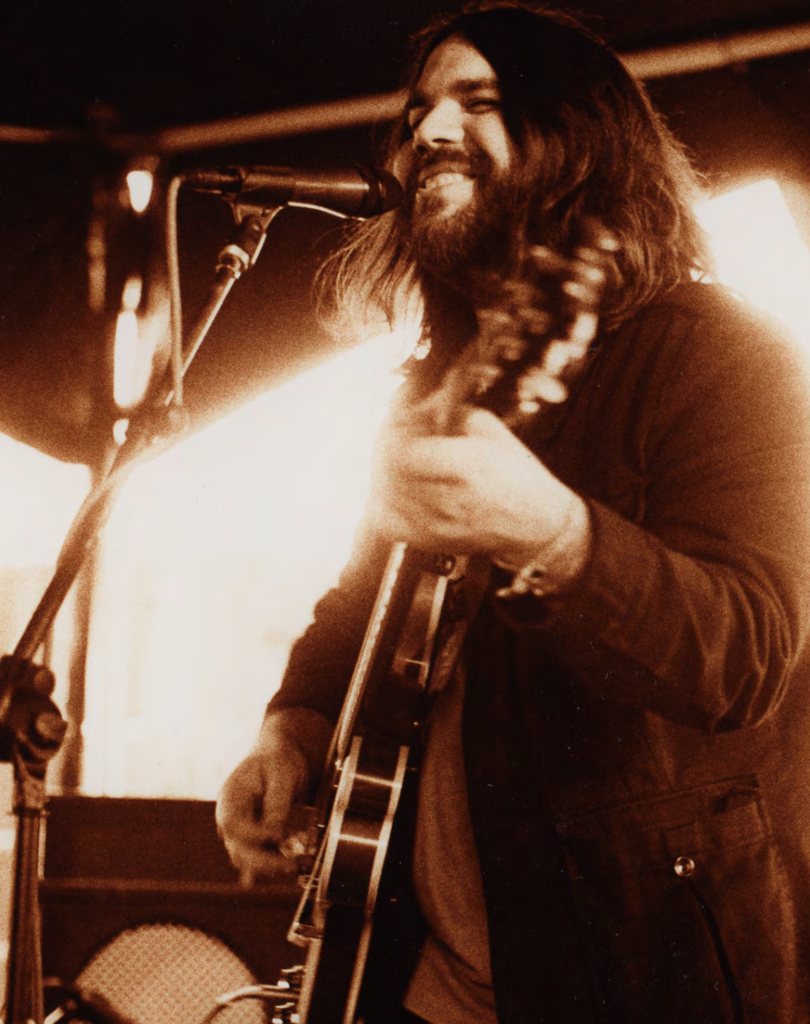
ROMEO STODART
The Magic Numbers were two families. The Stodarts and the Gannons.
We wanted to create music that was timeless.
We wanted to create a band that you could believe in.
We wanted to break your heart whilst lifting your spirit.
We wanted to make a classic debut album.
In 2004 The Magic Numbers were playing live almost every other night around London, making friends that soon grew into a following that spread the word the old-school way, by word of mouth. People told people about this new group comprising of two sets of brothers and sisters, who were singing a kind of country-soul-pop music with three-part harmonies. From the outside things seemed to be happening very quickly, but I’d been writing songs and playing empty venues with our drummer Sean for ten years before this momentum started building, and for us it really was always just a matter of time . . . but it sure took its sweet time. Honestly, though, it was only when our sisters Michele and Angela brought their magic to the band that anyone start taking notice, as then we discovered a sound. There was an energy between us that was somewhat frenetic, it was powerful; we knew we had something special and unique and, because of that, it also made us very cautious and protective.
Fifteen years ago it felt like we were on top of the world, capable of anything, full of promise, full of innocence – but also full of anxiety, still recovering from loss and having nothing.
We literally had nothing but each other and this music. So many dreams of ours started coming true, from selling out shows and hearing people sing along to our songs in the crowd, to being given the opportunity to go into the studio by Heavenly. The biggest dream was to make a record. Jeff and Martin’s belief in the band and myself as a songwriter at that time really gave us that extra confidence and boost that I think every artist needs, whether they’d like to admit it or not. So there we were, about to make this record.
Going into the studio can be a very daunting experience for a band, especially when the only real experience you’ve ever had is some home recording with a 4-track. We chose to work with Craig Silvey because we loved him straight away as a person and felt like he understood what we wanted to achieve. He was amazing at putting us at ease and not having us react to that red-light fever that sometimes creeps up on you. He wanted to stay true to what he’d seen us do live and just try to enhance that sonically as best as he could.
We had a shared vision of not wanting there to be too many overdubs on the record, as the core elements between the four of us when we played live was already telling the story in the way we had arranged the songs. It’s funny now to think that we ended up playing these huge festivals with literally a guitar tuner between us as we didn’t want anything else to colour the sound of our guitars being plugged straight into our amplifiers.
It’s always the songs for me that make a great record and we had the songs.
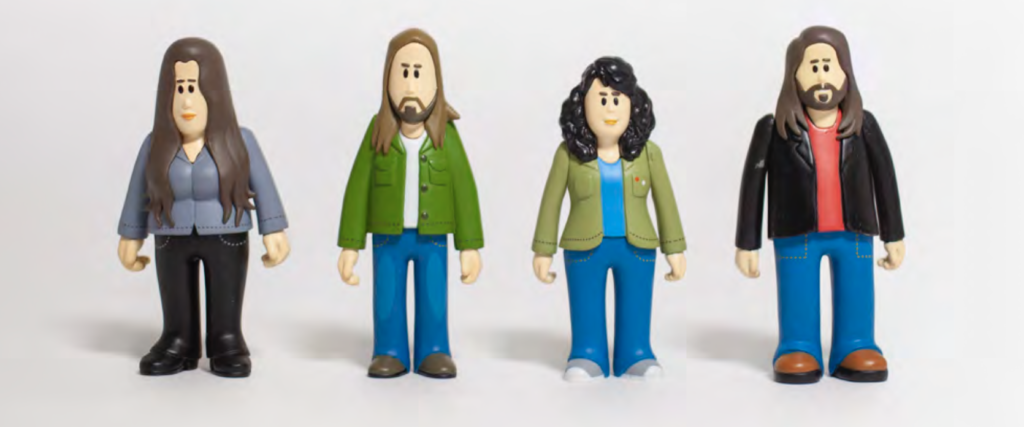
My sister Michele and I sat at our mum and dad’s and said, ‘Right, let’s write a song in D major.’ And I started pulsing on that opening chord, and Michele’s bassline took us on a journey like always: that melodic, hooky, driving thing that she does is key to what makes this music. We had so much fun writing ‘Mornings Eleven’ that I feel the spirit of that moment was captured in the song. We never really said it out loud to each other at the time but we both knew we were trying to write our very own ‘Good Vibrations’. We’d have never thought that it would be the opening song on our debut album.
Some of the songs on this album just appeared fully formed. ‘This Love’ in particular was written pretty soon after I had learnt of our grandmother’s death in New York, where Michele and I had grown up. I was heartbroken that I wasn’t there for her in those last days, especially as she had raised me as a little boy. I can clearly remember playing that opening triplet guitar figure, and the words and melody just came pouring out like they were always there. The same thing with ‘Which Way to Happy’, I remember the feeling of playing catch-up to what was coming out. Over the years I’ve learnt that it’s a very rare thing, songs appearing fully formed like that. It still surprises me when they do arrive like a memory of some kind. ‘Love’s a Game’ felt like it had always existed – in fact for a very long time I would ask people, ‘But does it remind you of anything?’ I remember playing ‘Forever Lost’ to the band, us rehearsing it and having fun with the arrangement, but I have no recollection of writing it.
So many songs came from such sad places – the end of a long-term relationship, death in the family, feeling so lost and vulnerable, this yearning for something else, to be someone else – but I guess unknowingly we disguised it with harmonies and hooks. ‘Love Me Like You’ was definitely one of those. No one spoke of the meaning of the song when I first played it, we all just dived straight in and started having fun with hooks and skips in the rhythm. It was the baby of the bunch, as it was only written a few months before we began recording, whereas ‘Try’ was probably the eldest of almost two years. Then there’s the duet between Angie and myself ‘I See You, You See Me’. My mum and dad were arguing downstairs and I knew it would only be a matter of time before they would make up and laugh about how ridiculous they were both being. I based the song on that kind of love, one that sees through everything. Angela’s voice on that still melts my heart.
I’d bought a set of these glockenspiel tone bars from a charity shop in Hanwell one afternoon, walking home from signing on at the job centre and, all the way back, I was thinking about this much more tender arrangement of a song I’d written called ‘Hymn for Her’. The climax of the song on the third chorus was originally how it was all throughout. I remember that day working on it with Michele and Angela, and as we were so excited about how it turned out we decided to play it live that night to a small few.
There’s so much love and hope and joy and honesty in that first album. So much fun in the arrangements, so much youth and innocence in our voices. It encapsulates a very precious time within the four of our lives. I’m still our biggest fan.
Fifteen years later we still want to create music that is timeless. We still want to be a band that you can believe in. We still want to break your heart whilst lifting your spirit. But we can’t ever make that first album again. We captured that moment in time. Upon reflection, it surpassed all of our wildest expectations.
Romeo Stodart
Preorder Believe in Magic: 30 Years of Heavenly Recordings here now
The Magic Numbers classic debut album is re-released this Saturday for Record Store Day as a special double LP limited edition on clear vinyl with extra 7 inch inside! Head to your local record shop to pick it up.

